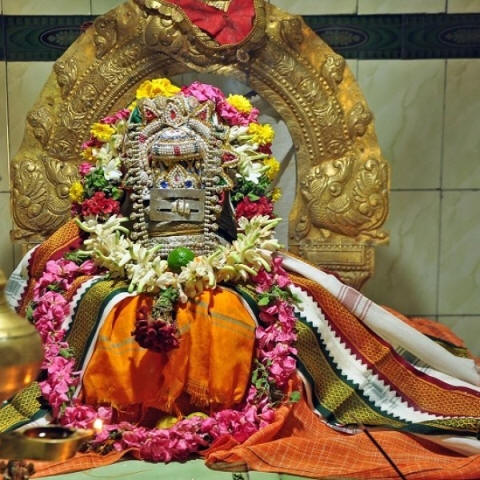Mānūr Siddhar Deivanāyakam
Published :28 Jan 2019 8 AMUpdated:28 Jan 2019 10 PM
Leaving behind the physical body, Mānūr Siddhar Deivanāyakam Siddhar
Thamizharasan P.V.

One day it was raining heavily. Siddhar Swamigal, tall and with his eyes gleaming with compassion, had his cloth thrown over his head. What is surprising is that not one drop of rain fell on him.
Pazhani hill was the habitat of many Siddhars. There are historical records of Pōkar and others having lived here. Near Pazhani, Deivanāyakam Swamy lived in Pōrūr in the 19th C. His Samādhi (Memorial) was in Pōrūr with some special notes. We sent to that memorial.
Mānūr was about 7km from Pazhaṉi. It was an area known for deer (Māṉ) and so received the eponymous name of Māṉūr. There is a common saying around this area: Madurai Pan leaves and Māṉūr Areca nuts. This is where , Deivanāyakam Swamy lived, died and has his memorial. The people of the area call him endearingly, Māṉūr Deivanāyakam Swamy. The memorial is on the riverside of Saṇmuga river in the middle of a beautiful flower garden.
In the dawn of the 19th century, there lived a magician in Māṉūr. The people then had fear of him, because he caused trouble to the locals with his magical powers. They were all waiting for the day they would gain relief from him. That was the time Deivanāyakam Swamy Siddhar arrived in the village.
One day it rained hard. Siddhar was walking in the rain and not a drop of rain fell on him.
The Mantra-meister was walking towards Siddhar from the opposite direction. He was in a state of surprise to see no raindrops on the Siddhar. Because of his self-serving egoism, he refused to step aside for Siddhar to pass by. He stood there obstinately, which made Siddhar to laugh. The Siddhar picked a straw from the ground and cast it on his baton. The baton broke into minute pieces. Witnessing this miraculous disintegration of his magical baton, he fell at his feet in sadness and shame and paid homage. Seeing this, the villagers jumped for joy and paid respect to the Siddhar.
People addressed his as Swamy and were ecstatic to learn that he decided to stay in their village and do good deeds to them.
Deivanāyakam Swamy Siddhar lived there for many years. The villagers lived free of diseases and hardships. He drank goat’s milk only once a day. He never ate any other food. The families took turns supplying him the milk daily. One day, by mistake, they gave brown sheep’s milk. Knowingly he drank it. He realized that there was some kind of message. He offered prayers to God and called the villagers.
I am ready to attain Jīva Samādhi under this mango tree Liṇgam. Do whatever services for such samādhi.
Hearing this, the villagers were heartbroken. They sought his forgiveness. They begged him to change his plan and forgive them. Without a change in his smile, he said, “After Samādhi, I am not going anywhere. Thought I will lose this physical body, I will remain here as a subtle body and guide all of you.”
Realizing that Deivanāyakam Swamy was firm in his decision, they prepared for his Jīva Samādhi in 1825 in the month of Chitra on an auspicious Thursday. Amidst crying villagers, he descended into the pit by the trunk of the tree and attained Samādhi. The people built a memorial.
The villagers to this day say Swāmigaḷ gives them a good life and removes all hardships of the devotees. People from all over India come here, beseech his help and enjoy the fruits of his blessings. The Muslims bear the cost of Gurupūjai festival here.
All are welcome to go to Māṉūr to receive the grace of Guru and the blessings of God, while visiting and receiving Darsan of the Jīva Samadhi. Special sacerdotal services take place at Paurnami every month, Sivarātri Pūjai and Swāmigaḷ’s Guru Pūjai in the Chitirai month.
Thamizharasan P V